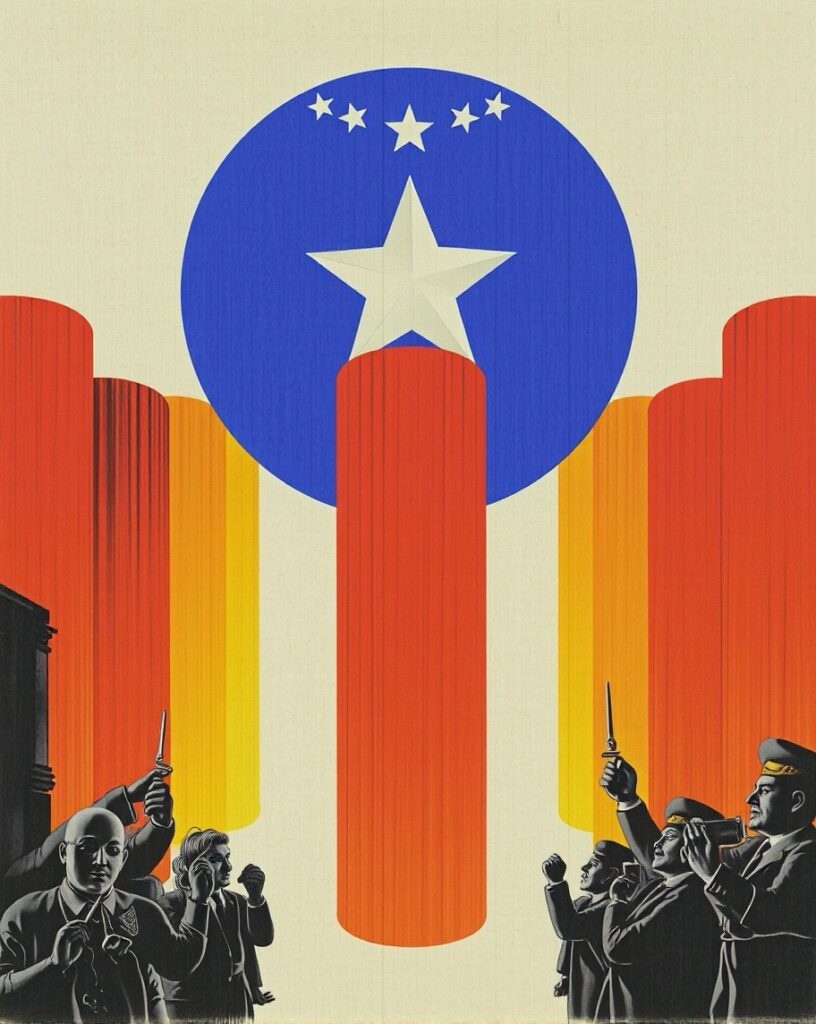Somewhere in the rotting heart of the American experiment, I found myself on a government-funded Greyhound bound for an undisclosed location—the proving grounds for Universal Basic Income. They wouldn’t tell me where I was going, only that I’d be “embedded” with the first generation of economic refuseniks: the Goobers. A new class of citizen, neither working nor unemployed, fueled entirely by state-sanctioned sloth.
The bus smelled like vape juice and microwaved pizza rolls. My seatmate, a 32-year-old man named Trent, had been awake for 46 hours. “The economy was rigged, man,” he told me between handfuls of Flamin’ Hot Cheetos. “So I opted out.” His plan? “I’m gonna start a podcast. Probably about Batman.” He passed out mid-sentence, mouth open, flecks of orange dust coating his hoodie.
We arrived at what had once been a mid-sized American city—abandoned strip malls, a skyline of billboards advertising gaming chairs and energy drinks. A banner hung across the main drag:
WELCOME TO THE GOOBERVERSE.
The town square was empty, the workforce decimated. At the local gas station, I met Trevor, a 29-year-old “crypto visionary” who hadn’t held a job since Arby’s fired him in 2018. “It’s sick, bro,” he told me, cracking open a Bang Energy and adjusting his Naruto headband. “I finally have time to focus on my content.”
His content? Reviewing every Dorito flavor ever made. He’s up to 43 videos and counting.
Down the road, a cohort of similarly liberated souls were gathered in an abandoned Circuit City parking lot, trading Pokémon cards and debating whether artificial intelligence could replace their weed dealer. “Work is a scam, man,” one of them said between coughs. “Andrew Yang saw the truth.” The others nodded solemnly.
My government contact, a nervous intern from the Department of Economic Experiments, handed me a pamphlet: UBI and You: A Guide to Maximizing Your Monthly Stipend. Inside were budget breakdowns that included “Essential Gaming Peripherals” and “Crypto Ventures (HIGH-RISK).” It was clear that whatever brain trust had designed this program had vastly overestimated the ambition of its recipients.
Down at the municipal complex—now repurposed into a 24-hour streaming facility—I met Derek, who had quit his job at a car wash six months ago. “I used to work 40 hours a week to barely afford rent,” he said, adjusting his VR headset. “Now I make content.” What kind of content? “Reaction videos.” Reaction to what? “Mostly other reaction videos.”
A few doors down, I met Lindsey, who had invested her entire stipend into custom Funko Pops of herself. “They’re limited edition,” she explained, holding one up. “This one’s me as a witch.” She didn’t seem to be selling them—just amassing an army of plastic clones.
At a makeshift town hall, a council of senior goobers convened to discuss “important matters.” The agenda included a debate on whether Taco Bell should be considered a public utility and a proposal to make Wednesday an official “Rest Day” (on top of the existing “No Work Mondays” and “Self-Care Fridays”). One man—draped in a Snuggie like some kind of stoner warlord—stood up to demand that the government subsidize anime merch. The motion passed without opposition.
Somewhere in the distance, a mountain of empty Mountain Dew cans shifted in the wind. The sun was setting over a civilization held together by Discord servers and expired Hot Pockets.
And I had the sinking feeling that this was only the beginning.
I followed the scent of burnt popcorn and Axe body spray to what appeared to be a makeshift UBI housing co-op—formerly a Red Roof Inn, now rebranded as The Creator Compound. The sign out front was hand-painted, the last two letters dripping as if the artist had been overtaken by the gravity of their own work—or perhaps just ran out of Monster Energy.
Inside, the lobby had been stripped of furniture and repurposed into a “collaborative workspace.” Every available surface was covered in gaming laptops, half-eaten bowls of ramen, and sticky game controllers. A young man in a bathrobe, Skyler, was slouched in a beanbag chair, deeply engrossed in a match of Fortnite. His stipend had allowed him to achieve a higher plane of existence—one in which pants were a relic of the oppressive capitalist machine.
“I’m finally free, man,” he said, eyes never leaving the screen. “The grindset is over. The vibes remain.”
Across the room, a pair of former DoorDash drivers were arguing about whether starting a “government-funded LAN party commune” violated the terms of their stipend. One of them, a man known only as “Skoob”, insisted that UBI was “the real-life version of passive income.”
“Money just shows up, bro,” he said, leaning back in his chair. “Like a respawn. Except the government is God, and God wants me to get really, really good at speedrunning Elden Ring.”
In a corner, an aspiring NFT mogul named Chet was furiously refreshing his phone, waiting for his latest project—“Goober Goblins”—to take off. “The problem is,” he explained, “nobody understands my vision.” I asked what the vision was. He stared at me, slack-jawed. “Uh. It’s like… goblins? But also, like, kinda vibing?”
Upstairs, the hallways were dimly lit, illuminated only by the glow of gaming monitors and anime posters. A feral-looking man in a bathrobe and compression socks stepped out of a room marked “Content House West” and blinked at me as if I had just emerged from the astral plane.
“Who sent you?” he asked.
I told him I was a journalist. He exhaled deeply. “Oh. Thought you were my Discord mod. I haven’t uploaded in a week.”
His name was Dustin, and he was a former “entrepreneur” whose startup—some kind of app that “optimized vibes”—had collapsed after his entire development team disappeared into the woods to find themselves. Now, thanks to UBI, he had pivoted to streaming conspiracy theories, specializing in the theory that Thomas Edison faked the moon landing.
“The lightbulb was just phase one,” he muttered, taking a sip from a novelty-sized Gatorade. “They don’t want you to know.”
Further down the hall, I encountered Kaylee, a self-described “Etsy Witch” who had spent the past three months using her stipend to collect vintage McDonald’s toys and “recharge her psychic energy.” She had a backlog of nearly 500 unshipped orders but assured me that “capitalism is an illusion, and these customers are, like, just experiencing my journey.”
Meanwhile, a man named Bryce was “investing” his stipend in professional wrestling lessons, determined to become the world’s first UBI-funded luchador. His finishing move? “The Direct Deposit.”
Outside, in what had once been the hotel’s parking lot but was now a 24/7 hacky sack tournament, I met Dev, a former IT guy turned professional YikYak philosopher, who was currently writing a manifesto on the blockchain.
“What’s it about?” I asked.
He stared at me, took a long pull from his vape, and exhaled.
“Money’s not even real, bro.”
At that moment, someone in the distance screamed, “DOORDASH IS HERE,” and a stampede of bathrobe-clad goobers erupted from the building.
The Goober Economy was in full swing. And I had the sinking feeling that the future belonged to them.
<>
It hit me in the dead hours, that peculiar cocktail of nicotine and existential dread, that the fat cats in Congress had found a way out—an escape hatch from the Herculean mess of developing a real, robust economy. Instead of wrestling with the monster of an entrenched tax system designed to rebalance an oligarchy, they’d discovered the UBI loophole: just print a check and call it “economic justice.”
I sat in the dim light of The Creator Compound, my eyes red as the fading neon of an abandoned strip mall, and began to see the grand scheme. The powers-that-be, with their tailored suits and indolent smirks, preferred the simplicity of a monthly cash infusion into the slack-jawed masses over the messy, unpredictable business of genuine reform. Reform? Ha! The idea that they might alter a tax code that lined their pockets like a well-oiled money machine was as laughable as expecting a cat to pay rent.
Everywhere I looked, goobers were marching to the steady beat of government checks—content with the crumbs while the real architects of wealth played chess in the corridors of power. Down on the street, a disheveled philosopher in a threadbare Supreme hoodie pontificated to his Discord followers:
“Why bother with revolution when you can just let the state fund your binge-watching and gaming?” he slurred, as if that were some kind of enlightened truth.
It was as if Congress had said, “Why risk a tax revolt or challenge the oligarchic order when we can simply buy your loyalty with a direct deposit?” And buy they did. With every check mailed, they solidified a docile underclass, a generation too busy streaming their lives to notice the slow strangulation of opportunity. No more messy debates about wealth redistribution or fixing a rigged economy—just an endless supply of digital dimes to keep you zoned out and plugged in.
I couldn’t help but think of the irony: a nation once defined by its scrappy, entrepreneurial spirit, now being pacified with a system that rewarded inertia. The establishment had traded in the promise of progress for a permanent pause—a government-sponsored coma induced by the comfort of a monthly stipend. In the halls of Congress, behind mahogany desks and piles of lobbyist donations, they chuckled at the simplicity of it all. It was easier to hand out checks than to tear apart the centuries-old tax code that safeguarded the interests of the wealthy elite.
As the night deepened and I roamed among clusters of UBI-fueled goobers—each one a living testament to America’s descent into convenient mediocrity—I saw the reflection of a society that had willingly surrendered its rebellious spark. The revolution wasn’t coming in the form of angry mobs or tear gas; it was arriving softly, like a lullaby sung by those too comfortably numb to notice the slow collapse of their own potential.
In that grim realization, I recognized the ultimate tragedy: the very mechanism designed to rescue the downtrodden was, in fact, a tool of mass pacification. Congress had discovered that the easiest way to quell dissent wasn’t by addressing the real rot in the system but by subsidizing the sedative of modern existence. And as I lit one more cigarette, watching the absurd parade of content creators and self-proclaimed visionaries drift by, the bitter truth settled over me like the smoke in the stale air of that forsaken compound.
This wasn’t progress. It was the elegant resignation of a society that had decided that comfort was preferable to the chaos of true change. And somewhere, in the back rooms of Capitol Hill, the strategists smiled—knowing full well that while the world outside continued to deteriorate, their chosen solution was as effortless as it was damning.
It was even worse. It was cheaper to pay UBI than to have them overdosed on fentanyl—cheaper, by a mile, than keeping the Seventh Fleet afloat on an endless patrol of aimless seas, or funding a full-scale opioid antidote program in America’s rust-belt nightmares. The fat cats in Congress had finally found their silver bullet: instead of wrestling with a tax system designed to rein in the oligarchy, they’d discovered that handing out monthly government checks was the ultimate sedative.
In the dim haze of that forsaken compound, I realized that the establishment had mastered the art of pacification. Instead of investing in expensive public health initiatives or propping up an overburdened military apparatus, they had simply printed cash. It was cheaper to dole out UBI than to launch an expensive public safety campaign, or to repair crumbling bridges and highways—much less to subsidize the ceaseless parade of overdoses ripping through our forgotten towns.
The absurdity wasn’t lost on me. The same folks who spent billions keeping naval fleets afloat and patching up failing infrastructure now shrugged as they approved budgets for “direct deposits.” In their sterile boardrooms, they compared notes with the casual cynicism of gamblers: Why fund a fleet of warships when you can fund a fleet of couch-bound content creators? Why pour money into sophisticated harm-reduction programs when you can simply replace despair with a steady trickle of government cash?
Somewhere deep within Capitol Hill, beneath the clamor of lobbyists and the scent of expensive scotch, these bureaucratic alchemists chuckled at their own brilliance. They realized that it was far cheaper—by an almost obscene margin—to keep the goobers sedated on a monthly stipend than to confront the messy, expensive business of real reform. The price tag on freedom from addiction and societal decay had been slashed to a government check, while costly dreams of rebalancing an economy steeped in oligarchic greed were quietly abandoned.
As I sat there, surrounded by the neon glow of half-remembered ambitions and the constant hum of digital distractions, the bizarre truth became undeniable: our society had found a way to buy passivity. And it was cheaper than almost any alternative—a fiscal miracle for those who preferred a sedated, socially engineered hothouse of modern mediocrity over the unpredictable chaos of genuine human potential.
It was still way way worse than I thought. Much worse. The foundation for this whole circus of largesse wasn’t some noble Keynesian fever dream or the bleeding heart of a desperate government trying to keep the ship from sinking. No, the real magic trick—the sick, dazzling sleight of hand—was that UBI wasn’t paid in dollars at all. It was paid in crypto.
And not just any crypto. No blue-chip Bitcoin, no sensible stablecoin tethered to anything real. No, every goober got their own custom memecoin, minted straight from the bowels of some algorithmic financial wizardry, a digital scrip backed not by gold, nor labor, nor even the rotting husk of American manufacturing, but by the full faith and credit of a system designed to swindle them blind.
And here’s where it got really diabolical: the bags were guaranteed by the Treasury and the Federal Reserve. Every single one of these government-issued clown tokens—GoobCoin, SlackBuck, Stimulus Stonk, whatever brand name they came up with—was insured by the same people who used to pretend they cared about fiscal responsibility. It was, in effect, a rigged game where Congress had positioned itself as the ultimate bag-holder, except they weren’t losing money. They were making it.
Because once you guarantee something with taxpayer money, the smart money steps in. The hedge funds, the investment banks, the insider traders—all of them sniffed the game immediately. They knew these goobers weren’t going to hold onto their coins. No, they’d be cashing out their digital scrip for rent money, vape juice, and the latest subscription service designed to keep them docile. And that’s when the big boys swooped in, bought up the dumped coins at a fraction of their worth, pumped the market with carefully coordinated hype, and cashed out before the goobers even realized they’d been turned into liquidity providers for the same ruling class that had abandoned them in the first place.
Congress, in its infinite depravity, had found the holy grail: a perpetual motion machine of economic exploitation. Every goober wasn’t just a recipient of UBI—they were an asset, a walking, talking memecoin that could be manipulated, pumped, and dumped at will. The whole system was a new-age, high-frequency trading scam dressed up as progressive policy. And the real joke? The goobers loved it.
I saw them in the compound, eyes glued to their screens, watching their net worths skyrocket for thirty glorious seconds before crashing into oblivion. They called it “playing the market,” as if they were captains of industry and not just ballast for a yacht they’d never be allowed to board. One particularly glassy-eyed influencer, wearing a hoodie emblazoned with “HODL OR DIE”, grinned at me and said, “Bro, my UBI bag just 10x’d overnight.”
And it had. For a brief, shimmering moment, he was a king. Then the market corrected, and he was back to where he started. Or lower. It didn’t matter. The cycle would begin again next month.
Meanwhile, the suits in Washington, those degenerate swamp creatures who had engineered this digital casino, cashed out their gains, patting each other on the back for having finally solved the age-old problem of poverty: not by eliminating it, but by turning it into just another asset class.


